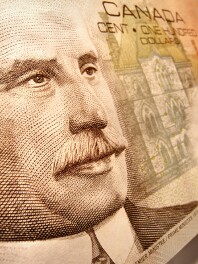
The Canadian dollar is strengthening against its US counterpart as the central bank hinted that a rate hike is on the table, but it depends entirely on economic data â both at home and abroad. The loonie has improved against the greenback so far this year, despite the Bank of Canada (BOC) taking a wait-and-see approach on interest rates. Rising crude oil prices are also helping lift the currency to finish off the trading week.
Speaking in a comprehensive sitdown interview with Bloomberg TV in Davos for the World Economic Forum, BOC Governor Stephen Poloz explained how he is moving forward with interest rates. It can be summed up by one word: data.
Poloz revealed that the central bank is paying attention to the Canadian real estate market, international trade tensions, and crude oil prices. The next rate hike will depend on these factors, adding that he does believe borrowing costs will inevitably go higher. While it is a matter of timing, Poloz noted that the economy is in a âsteady state,â so âinterest rates also should be near their steady state.â
We are at a stage in the cycle where it always looks like monetary policy is doing the wrong thing.
Meanwhile, according to The Financial Post, Canada could experience something it has not faced in nearly seven decades: a recession without the US also suffering from an economic contraction.
However, median estimates suggest that most economists, analysts, and the BOC do not see a recession anytime soon. The chances of a recession over the next 12 months are about 20%. That does not mean there will be sluggish growth in the same time frame â the BOC slashed its 2019 growth rate to 1.7% and to 2.1% in 2020.
But the US has a better chance of a recession, with the odds hitting 25%, based on 50 surveys.
On the data front, wholesale trade declined 1% in November to $63 billion, while manufacturing sales slipped 1.4% to $57.3 billion.
March West Texas Intermediate (WTI) crude oil futures surged $0.52, or 0.98%, to $53.65 per barrel at 16:45 GMT on Friday on the New York Mercantile Exchange. Oil, which is one of Canadaâs biggest exports, has had a good start to 2019, advancing more than 16%.
The USD/CAD currency pair tumbled 0.7% to 1.3259, from an opening of 1.3351. The EUR/CAD rose 0.09% to 1.5113, from an opening of 1.5092.
If you have any questions, comments or opinions regarding the Canadian Dollar,
feel free to post them using the commentary form below.